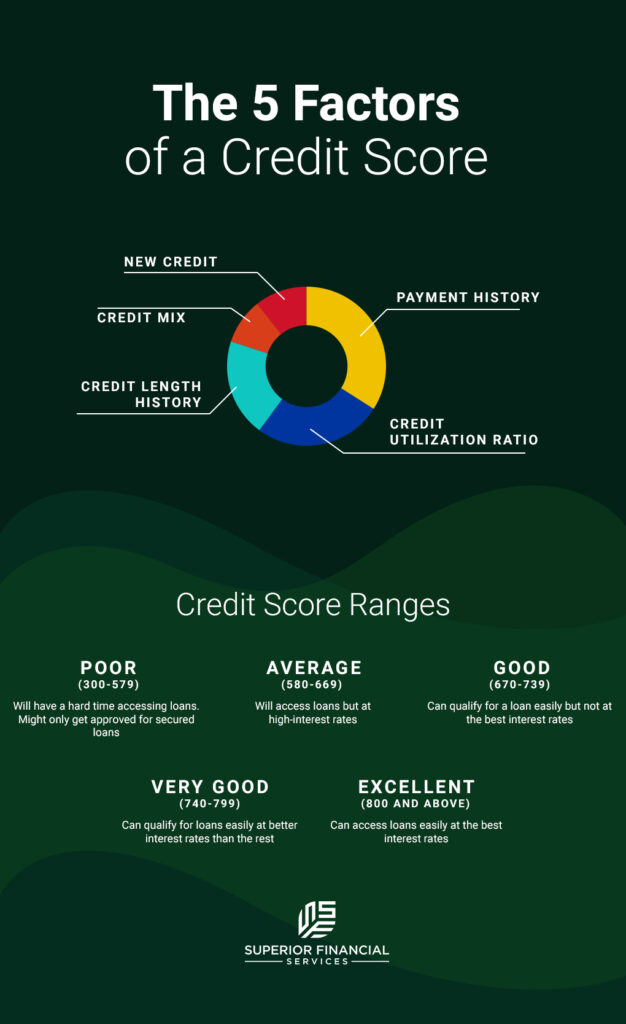It’s a simple three-digit number, but your credit score can dictate the direction of a lot of things in your life. It determines the volume of loans you can get, the interest rate, and other loan repayment details. It can also dictate other aspects of your life, from where you live to the kind of jobs you can have. Landlords and employers might need to look into your credit score when making decisions, especially in highly competitive application processes.
As a result, people with a high credit score tend to have better access to opportunities. Learning exactly how a credit score is calculated and what impacts your credit score is a necessity. This information can help you build a strong credit score to have an easier time navigating financial emergencies and commitments.
Here is what you should know about your credit score:

It’s a simple three-digit number, but your credit score can dictate the direction of a lot of things in your life. It determines the volume of loans you can get, the interest rate, and other loan repayment details. It can also dictate other aspects of your life, from where you live to the kind of jobs you can have. Landlords and employers might need to know your credit score when making decisions, especially in highly competitive application processes.
As a result, people with a high credit score tend to have better access to opportunities. Learning exactly how a credit score is calculated and what impacts your credit score is a necessity. This information can help you build a strong credit score to have an easier time navigating financial emergencies and commitments.
Here is what you should know about your credit score:

Credit Scores In A Nutshell
Your credit score is a short representation of your creditworthiness – it tells the story of how responsible you are as a borrower and can help you earn the trust of lenders. Lenders use this number to gauge your chances of repaying a loan in good time. A good credit score makes it easier to get personal or business loans at affordable interest rates.
Your credit score is typically derived from your credit report—a document that outlines your credit situation, from loan history to the number of credit card accounts under your name. There are three credit reporting bureaus responsible for compiling your credit report: TransUnion, Equifax, and Experian.
How A Credit Score Is Calculated
What affects your credit score? While there are multiple models for calculating credit scores, the main ones are the FICO Score and the VantageScore. All credit scoring models come up with a figure for your score and place it within a specific range. Your score can be ranked as poor, average, good, very good, or excellent. Although the specific credit score figures tend to vary depending on the scoring model used, the ranges in all scoring models are similar.
These small differences in scores from different credit bureaus are normal. The credit reporting bureaus tend to keep the intricate details of how a credit score is calculated confidential. They, however, provide enough information into the specific determinants of the score. Here are the five credit score factors:
- Payment history (35%) – This is by far the most important part of your credit score, and it forms 35% of the final credit score. It shows lenders whether you have been paying your credit balances and how soon you made the payments. They can use this information to gauge whether, based on your history, you will pay them back with little friction.
- Credit utilization ratio (30%) – This is a ratio of the total credit available to the actual amount of credit you take up. It is a vital part of how a credit score is calculated and it accounts for 30% of the final credit score. If you are using most of the credit made available to you, lenders will see you as a high-risk borrower. The chances that you will default can be quite high in their eyes.
- Length of credit history (15%) – The age of your credit accounts impacts what your credit score will look like. The scoring models look into the oldest, newest, and the accounts in the middle. The longer your credit history is, the better. As such, keeping old credit accounts open could help in maintaining your score high.
- Credit mix (10%) – The diversity of your credit accounts is an important part of how your credit score is calculated. For instance, having a mortgage, credit cards, and personal loans can be considered a healthy credit mix. However, it isn’t necessary for you to have multiple and diverse credit accounts, though you might get a bit of a higher score with them.
- New credit (10%) – The total number of new credit accounts you open will impact your credit score, and this accounts for 10% of the final figure. If you have been opening multiple credit accounts over a short period of time, lenders could see you as a high-risk borrower.
The Different Credit Score Ranges

Now that you have learned how a credit score is calculated, you should know about the different credit score ranges. The FICO score is more widely used than the Vantage Score, and that’s what we will use here. Ideally, the FICO credit score ranks creditworthiness between 300 and 850. If you are looking for a personal or business loan, where you fall in this range will determine your ease of getting a loan and at a good interest rate:
1. Poor (300-579)
If your score falls in this range, your chance of getting credit from lenders is low. Lenders will perceive you as a high-risk borrower. In most cases, you might only qualify for secured loans—you will need to provide a downpayment or collateral.
2. Average/Fair (580-669)
Borrowers in this range can qualify for loans. The only downside is that they might need to pay high-interest rates for the loans.
3. Good (670-739)
Most lenders consider this credit score range as acceptable. You can qualify for multiple credit cards and loans with this score, but not at the best interest rate in the market. If you have plans to apply for a Small Business Administration (SBA) loan, this is the lowest range that can get approval.
4. Very Good (740-799)
Applicants within this range have better chances of approval and great interest rates.
5. Excellent (800 and above)
This is the coveted credit score range. Borrowers in this range can access multiple loans and credit cards at the best interest rates.
Keeping Track of Your Credit Report
The process of how a credit score is calculated isn’t perfect, and this impacts what your final credit score looks like. If your credit report has a few mistakes, the chances are that they may affect your score. This is why it is essential to keep an eye on your credit score and report. If you believe there are mistakes, feel free to file a complaint with the respective credit bureau.
Every year, you are entitled to receive a free copy of your credit report from each credit bureau. By getting a copy every four months from a different bureau, you can keep track of your credit score while watching out for mistakes.
How Often Is Your Credit Score Calculated?
Every month, lenders submit information about any credit account you hold with them. Depending on this information, your score may or may not be impacted. Your credit score is also recalculated whenever you or a lender makes a request about your credit score.
It might be tough to see significant changes in your credit score in a short span of time. However, you might start noticing changes as you make loan payments on time and improve your credit utilization ratio. Monitoring your credit score is an initial step towards improving it. It can also help you identify signs of errors, identify theft, and fraud.
Work On Improving Your Score
Now that you know how a credit score is calculated and everything that impacts what your credit score looks like, it’s time to start improving it! Remember, high credit scores give you a better chance of being approved for a loan at amazing interest rates.
Need financial assistance? Apply for a loan now from Superior Financial Services. With our free consultation and same-day decision policy, you can get financed quickly.
